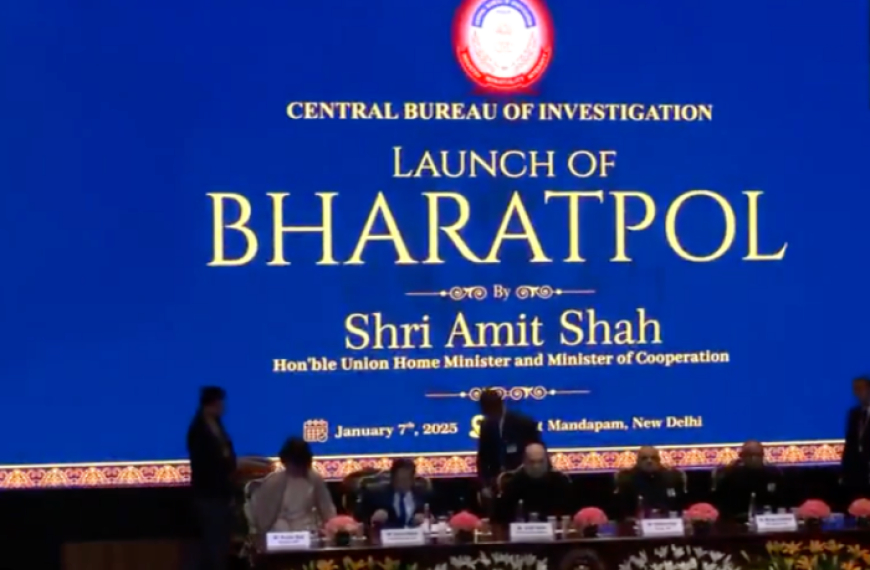Bharatpol Unveiled: Inside CBI’s Global Crime Portal and Its Strategic Boost to India-Interpol Cooperation
Amit Shah launches Bharatpol, a new CBI portal to enhance India's international crime-fighting capabilities and streamline collaboration with Interpol. Learn how it changes the landscape.

In a significant move aimed at modernizing India's global law enforcement capabilities, Union Home Minister Amit Shah launched "Bharatpol", a dedicated international crime-fighting portal developed by the Central Bureau of Investigation (CBI). This portal represents a major leap forward in India's digital infrastructure for cross-border criminal investigations and is poised to transform the nation's collaboration with Interpol and other global agencies.
The unveiling of Bharatpol signals not just a technological advancement, but also a strategic pivot in how India addresses transnational crime—ranging from cyber fraud and drug trafficking to terrorism and financial crimes. As the world witnesses the increasing globalization of criminal networks, Bharatpol places India firmly in the frontline of digital policing on an international scale.
What Is Bharatpol?
Bharatpol is India’s first integrated digital platform for managing international criminal intelligence, extradition requests, Red Notices, and law enforcement alerts. It is designed to centralize and streamline coordination between the CBI, Interpol, and Indian law enforcement agencies across states and union territories.
This platform enables:
-
Real-time updates on Interpol notices and cross-border fugitives.
-
Tracking and processing extradition requests with improved transparency and speed.
-
Data-sharing between state police and the CBI for cases with global dimensions.
-
Automated alerts for cyber crimes, human trafficking, and financial frauds.
According to CBI Director Praveen Sood, Bharatpol will act as a “single-window interface” between Indian investigating agencies and international counterparts.
“It brings transparency, accountability, and speed to an area long plagued by procedural delays,” Sood stated during the launch event in New Delhi.
Why Bharatpol Matters Now
Over the past decade, India has faced growing challenges linked to transnational criminal networks, particularly in cases involving:
-
Money laundering via foreign shell companies,
-
Smuggling of narcotics across maritime borders,
-
Cyberattacks originating from hostile foreign entities,
-
Fugitive economic offenders like Nirav Modi and Mehul Choksi.
Traditional coordination with Interpol has often been hampered by paper-based processes, jurisdictional conflicts, and diplomatic roadblocks. Bharatpol seeks to change that by establishing a cloud-based digital ecosystem that integrates Interpol alerts with India's internal databases such as:
-
Crime and Criminal Tracking Network & Systems (CCTNS),
-
Immigration, Visa and Foreigner Registration Tracking (IVFRT), and
-
National Automated Fingerprint Identification System (NAFIS).
This interconnectivity enhances the speed of red corner notices, allows real-time alerts for border checkpoints, and supports the Ministry of External Affairs in more effective passport cancellations for fugitives.
Strengthening CBI–Interpol Collaboration
India has long maintained membership in Interpol, the world’s largest international police organization. However, bureaucratic lags and lack of streamlined tech infrastructure have previously limited India’s ability to fully utilize this network.
With Bharatpol, CBI now aims to:
-
Reduce the average processing time for extradition cases by 40–50%.
-
Automate Interpol Red Corner and Blue Corner notices submission with real-time validation.
-
Conduct data mining on fugitive movement, financial transactions, and known associates.
This platform also empowers India to contribute more proactively to Interpol's I-24/7 secure global police communications system, enhancing India's visibility and credibility in global crime-fighting efforts.
According to a recent report by the Observer Research Foundation (ORF), such digitization will allow India to “punch above its weight” in international policing forums and play a more assertive role in global anti-terror and cyber defense strategies.
Implications for Domestic Law Enforcement
Bharatpol is not just about international coordination—it is expected to enhance domestic policing standards as well. With real-time access to global threat intelligence, local police can act faster on:
-
Alerts about radicalized individuals returning from conflict zones,
-
Cybercrime gangs operating through dark web platforms,
-
Illegal migration and human trafficking rackets with cross-border links.
Furthermore, the portal will help law enforcement trace financial fraudsters who exploit offshore tax havens, using tools such as SWIFT alerts, blockchain analysis, and global KYC databases.
Senior IPS officials from Maharashtra and Karnataka have welcomed the roll-out, calling it a “game-changer for state-level police modernization.”
Legal and Privacy Considerations
While Bharatpol promises greater efficiency, it also raises important legal and privacy questions. Human rights groups have cautioned against the potential misuse of centralized surveillance tools without adequate oversight mechanisms.
Legal experts have highlighted the need for:
-
Stricter data protection norms aligned with India’s Digital Personal Data Protection Act (DPDP Act),
-
Transparent audit trails for Red Notice decisions,
-
Mechanisms to prevent political misuse of international alerts.
India’s history with politically sensitive Interpol notices—such as the refusal to issue a Red Corner Notice against controversial figures for alleged political reasons—makes it imperative that due process is safeguarded in every step of Bharatpol’s implementation.
Global Reactions
International law enforcement observers have praised India’s efforts, noting that Bharatpol aligns with the UN’s strategy for digitized law enforcement and Interpol’s “Connecting Police for a Safer World” vision.
According to a Carnegie Endowment paper on Global Policing, India’s approach could serve as a model for other developing countries looking to improve international crime collaboration without compromising sovereignty.
Conclusion
With Bharatpol, India has stepped into a new era of digital, globally-connected law enforcement. Under the leadership of Amit Shah and the operational command of the CBI, this portal reflects a clear strategic intent: to modernize India’s crime-fighting infrastructure, strengthen its international partnerships, and reduce delays in global criminal justice cooperation.
However, the success of Bharatpol will ultimately depend on how well it balances efficiency with transparency, speed with legality, and ambition with accountability. If implemented with rigor and ethical safeguards, Bharatpol could become a cornerstone of India’s 21st-century security architecture.














